All products featured are independently chosen by us. However, SoundGuys may receive a commission on orders placed through its retail links. See our ethics statement.
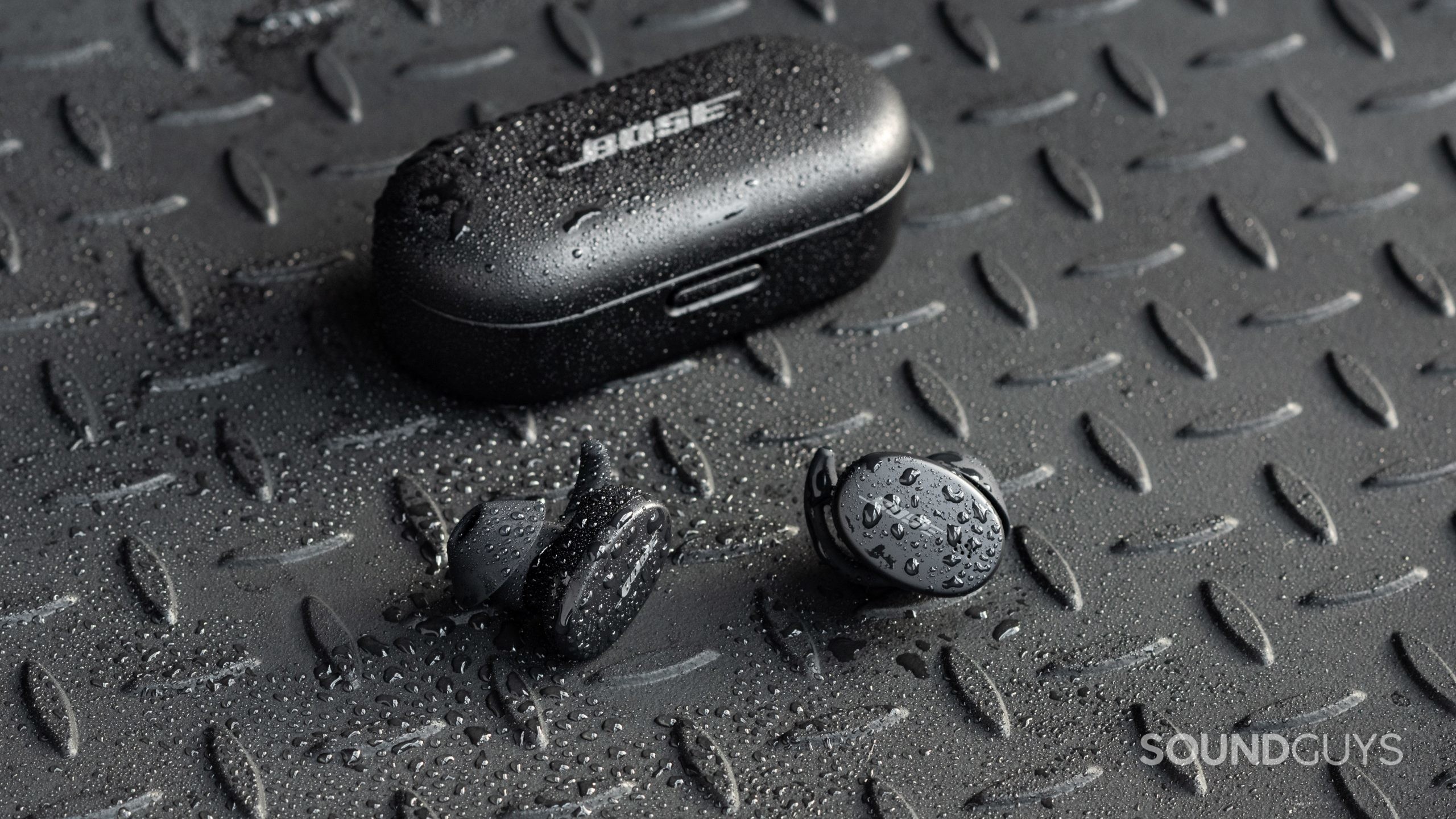
Bose Sport Earbuds review
May 15, 2023
Bose Sport Earbuds
Everyone deserves a second chance, or at least Bose hopes you feel that way. The Bose Sport Earbuds are the company’s sophomore true wireless workout earbuds and are sure to be a mainstay among gym-goers. Did Bose actually improve on the original SoundSport Free, or did it just repackage old issues? Let’s find out in our full Bose Sport Earbuds review.
Editor’s note: This Bose Sport Earbuds review was updated on August 2nd, 2024, to answer user-submitted FAQs and update formatting.
Athletes should get these earphones because they have an IPX4 rating and feature easily operable touch controls. Anyone can use the Bose Sport Earbuds because the proprietary ear tips keep the buds in place no matter what. The embedded mics make it easy to take hands-free calls from anywhere, and you can charge the bud and case up in a pinch.
What’s it like to use the Bose Sport Earbuds?
Bose selected plastic for its Sport Earbuds, which is a smart move since weight and durability are key to great workout earbuds. The earbuds’ design is very plain but modern. There isn’t a rough edge or corner on the Sport Earbuds. The oblong shape protrudes from the ear, but it doesn’t draw nearly as much attention as the original SoundSport Free true wireless earbuds.
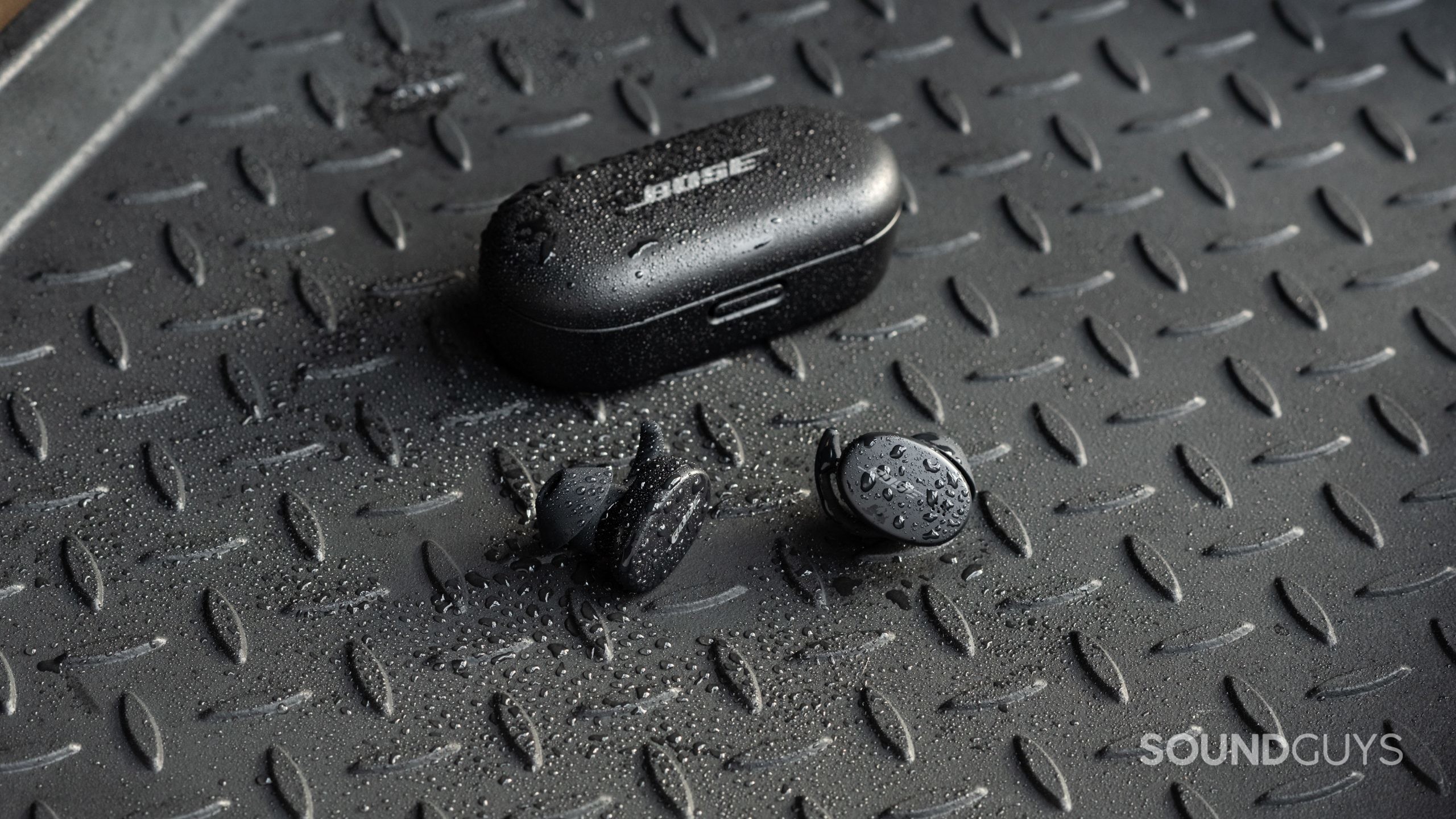
The earbuds are free of any buttons, and the outside of each housing serves as a touch panel. Initially, controls were very limited, but Bose has since added the ability to use the right earbud to adjust volume. You can pause playback with a double-tap of the right earbud or by removing it. Only the right bud houses a sensor for automatic ear detection and automatic play/pause functionality. Another thing exclusive to the right earbud is mono listening. If your right ear is hearing impaired, you can’t yet use the left earbud alone, which is a real shame.
The StayHear Max ear tips are one of the best features of the Bose Sport Earbuds. The ear tips look intimidating and are much larger than your standard sleeve, but they work wonders. No matter how much I shake my head, the earbuds stay in place. They’re also extremely comfortable: the wing tips lightly grip your concha, and the ear tips create a relatively pain-free seal to your ear canals. (Ed. Note: this won’t be true for everyone. Some people just can’t wear in-ears without some discomfort)
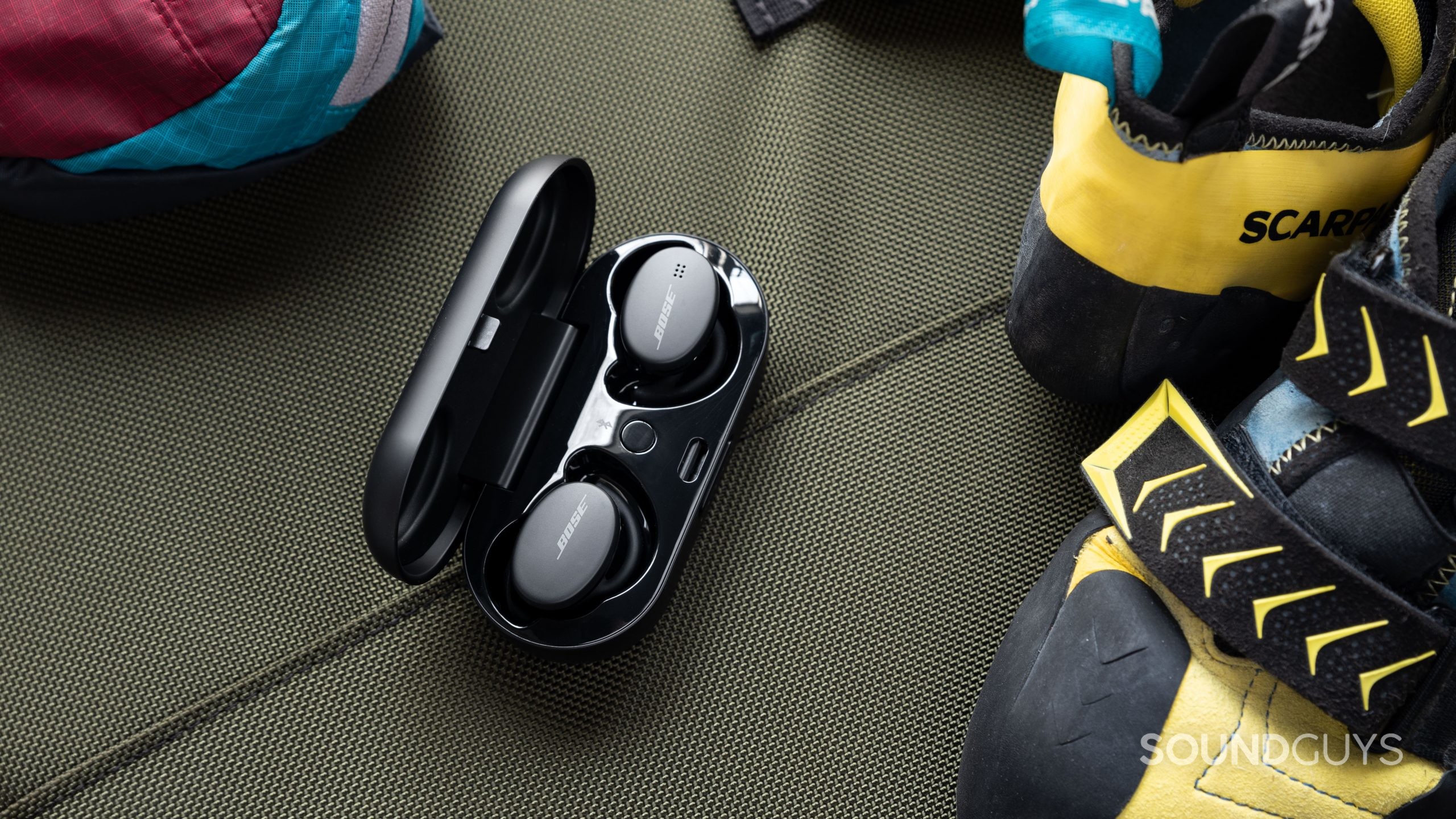
The case isn’t anything special, though it’s much more compact than the one included with the Bose SoundSport Free. Unlike most true wireless headset cases, the Bose Sport Earbuds case doesn’t rely on magnets to keep it shut. Instead, you must press a button that releases a lever, opening the lid. While it’s not as satisfying to use as something like the Google Pixel Buds A-Series case, it’s more functional because it guards against accidental openings anytime you drop it.
Four LEDs line the outside of the case and indicate the remaining battery levels, while a single Bluetooth pairing button rests inside. You’ll end up pressing this a bit because the Sport Earbuds have their fair share of connection quirks.
How do you control the Bose Sport Earbuds?
The Bose Sport Earbuds have far fewer onboard controls than the original Bose SoundSport Earbuds. The possible controls for the Bose Sport Earbuds are as follows:
| Action | Left side | Right side |
|---|---|---|
| Action Two taps | Left side Skip songs | Right side Pause/play music |
| Action | Left side Check battery percentage | Right side Pickup/end phone call |
| Action Hold | Left side | Right side Access smart assistant |
| Action | Left side | Right side Reject incoming calls |
| Action Remove/insert | Left side | Right side Pause/play music |
| Action Swipe | Left side | Right side Volume up/down |
Should you get the Bose Music app?
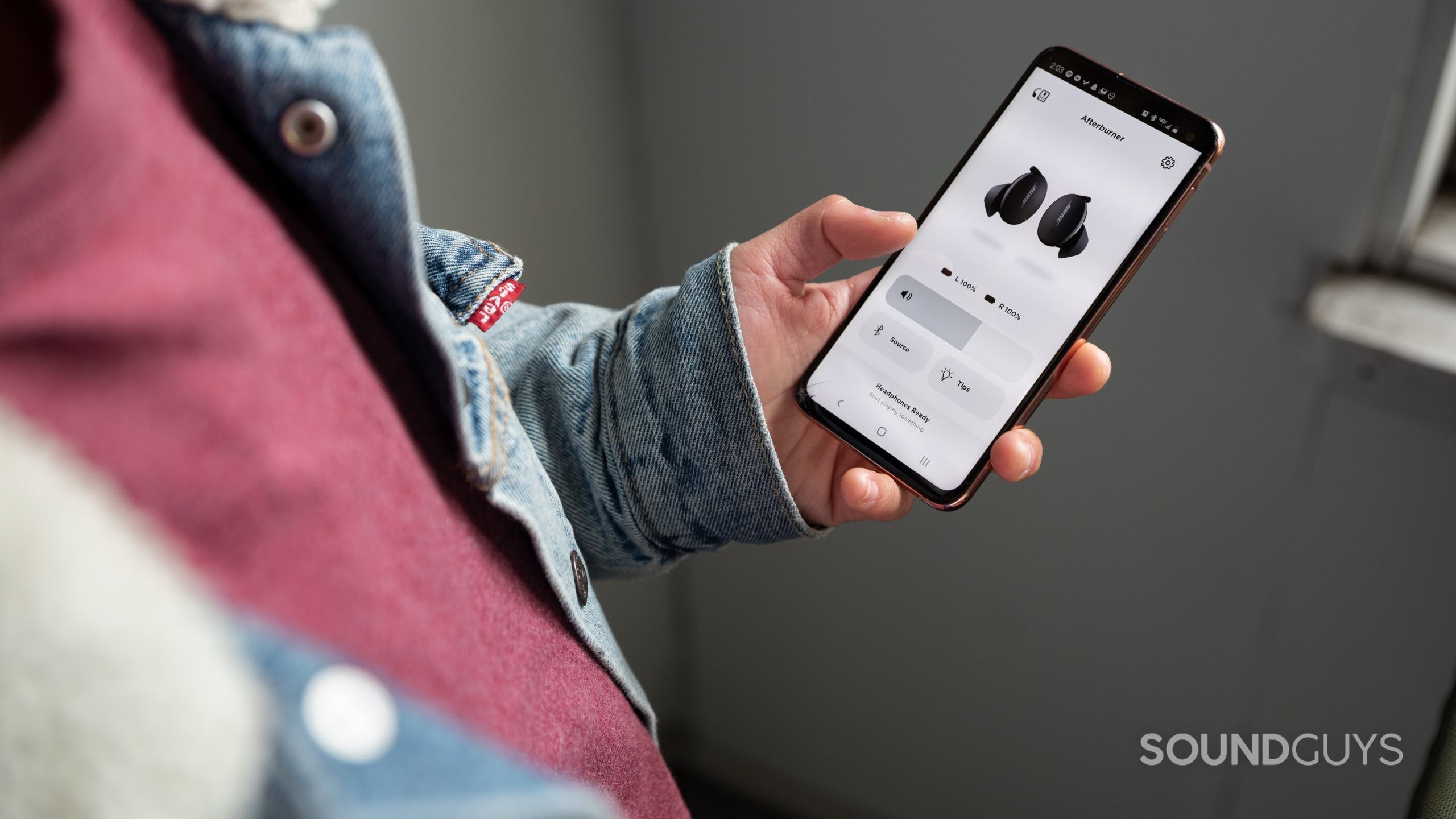
You should get the Bose Music app (Android/iOS) for firmware updates and assign a function to the left earbud; otherwise, it’s pretty sparse. Initially, you couldn’t create a custom EQ, but with firmware 2.0.7+ and app version 5.0.2+ (iOS) or 5.0.1+ (Android), you can. Those who don’t want to tinker can rely on Bose’s championed Active EQ software. When you download the app, you must agree to its EULA and give it some permissions before accessing it.
You can use the Bose Music app to switch between paired devices. Alternatively, you can just use your smartphone’s Bluetooth settings and disable call and audio streaming, but that is more involved than the Bose Music app options. You can also toggle Bose’s voice prompts if you find them redundant. The app also displays clear battery readings and lets you customize the name of the earbuds. I don’t care for the latter feature, but Bose does have some creative name options.
How does the Sport Earbuds connect?
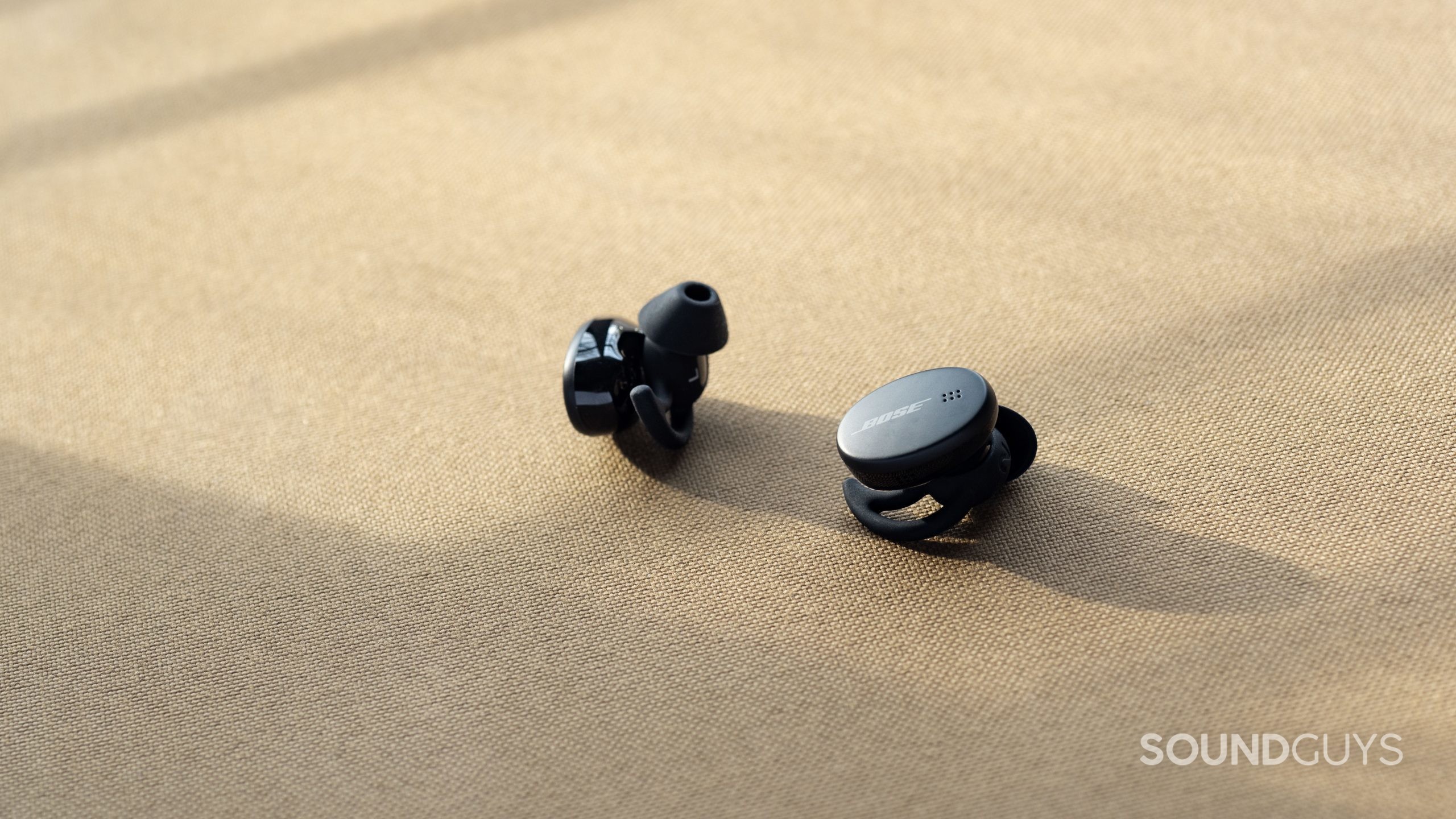
Both the SBC and AAC Bluetooth codecs are supported, which is good news for iPhone owners since AAC plays well on iOS. If, however, you have an Android phone, your handset may have trouble maintaining high-quality AAC streaming to the Bose Sport Earbuds. If connection issues become too egregious, sometimes the best option is for you to force SBC streaming from the developer settings of your smartphone.
The Bose Sport Earbuds operate via Bluetooth 5.1. At first, the connection quality was unstable, but Bose fixed this with an update to firmware version 1.0.7-10904+620b71c.
Bluetooth 5.1 has more advanced location features than Bluetooth 5.0. It can pinpoint the directionality of your peripheral’s location relative to its source device (the distance and direction between your earbuds and smartphone). Bluetooth 5.1 can improve the accuracy of features like “find my earbuds,” which isn’t supported by version 4.1.1 of the Bose Music app.
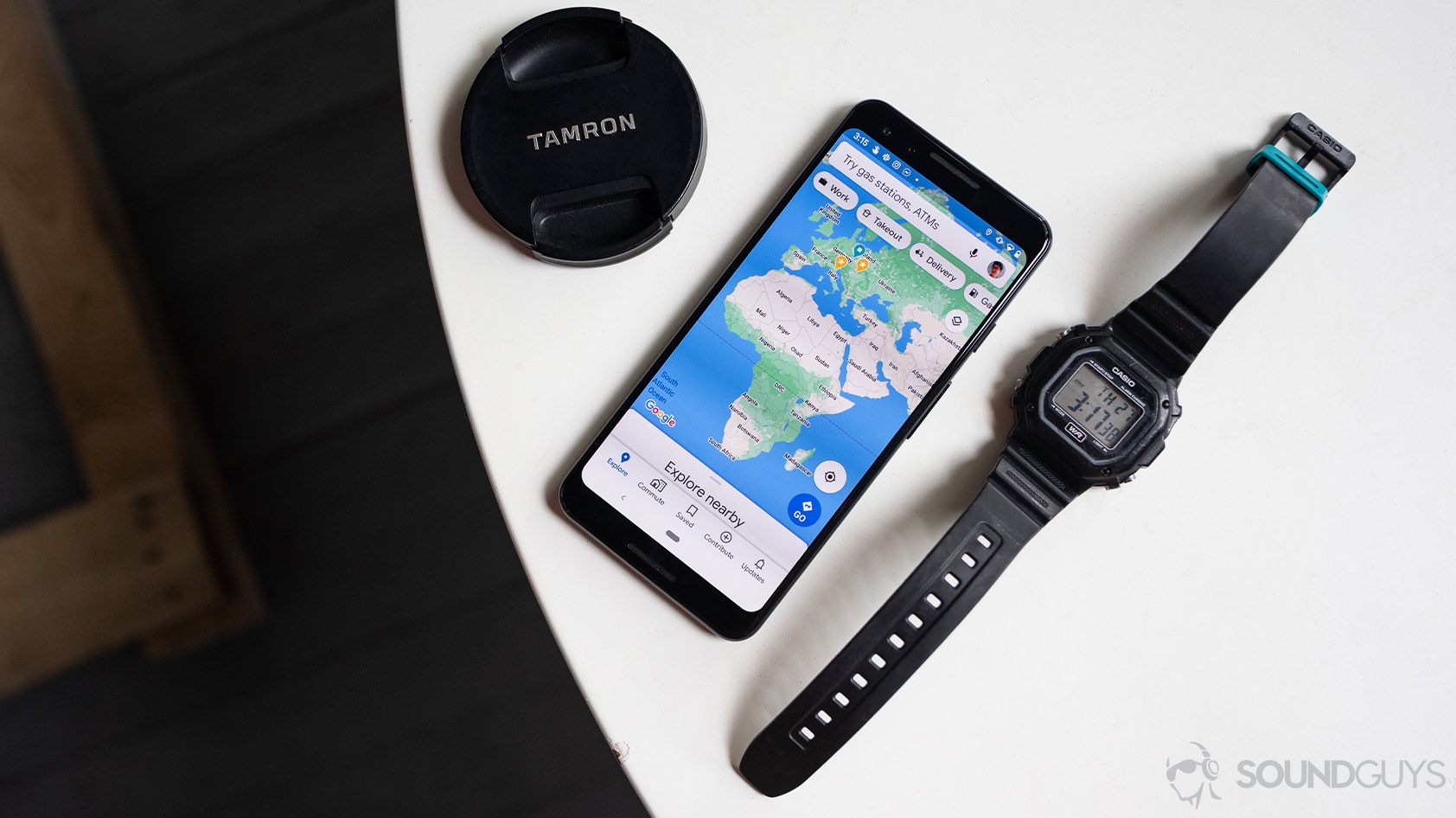
The 5.1 firmware has a revamped caching system, which makes it even more energy-efficient than Bluetooth 5.0. You can expect a minor bump in battery life between 5.1 and 5.0 Bluetooth devices. With this new caching system comes the ability to make faster connections, so automatically connecting to a smartphone should be instantaneous, though it isn’t perfect with these earbuds. It also makes it easier to broadcast the Bose Sport Earbuds connection status if you’re trying to pair it to a device.
Bluetooth 5.0 and Bluetooth 5.1 fall under the Bluetooth Low Energy (LE) standard; they are not a part of LE Audio. LE Audio is supported in Bluetooth Core Specification version 5.2.
How long does the battery last on the Bose Sport Earbuds?
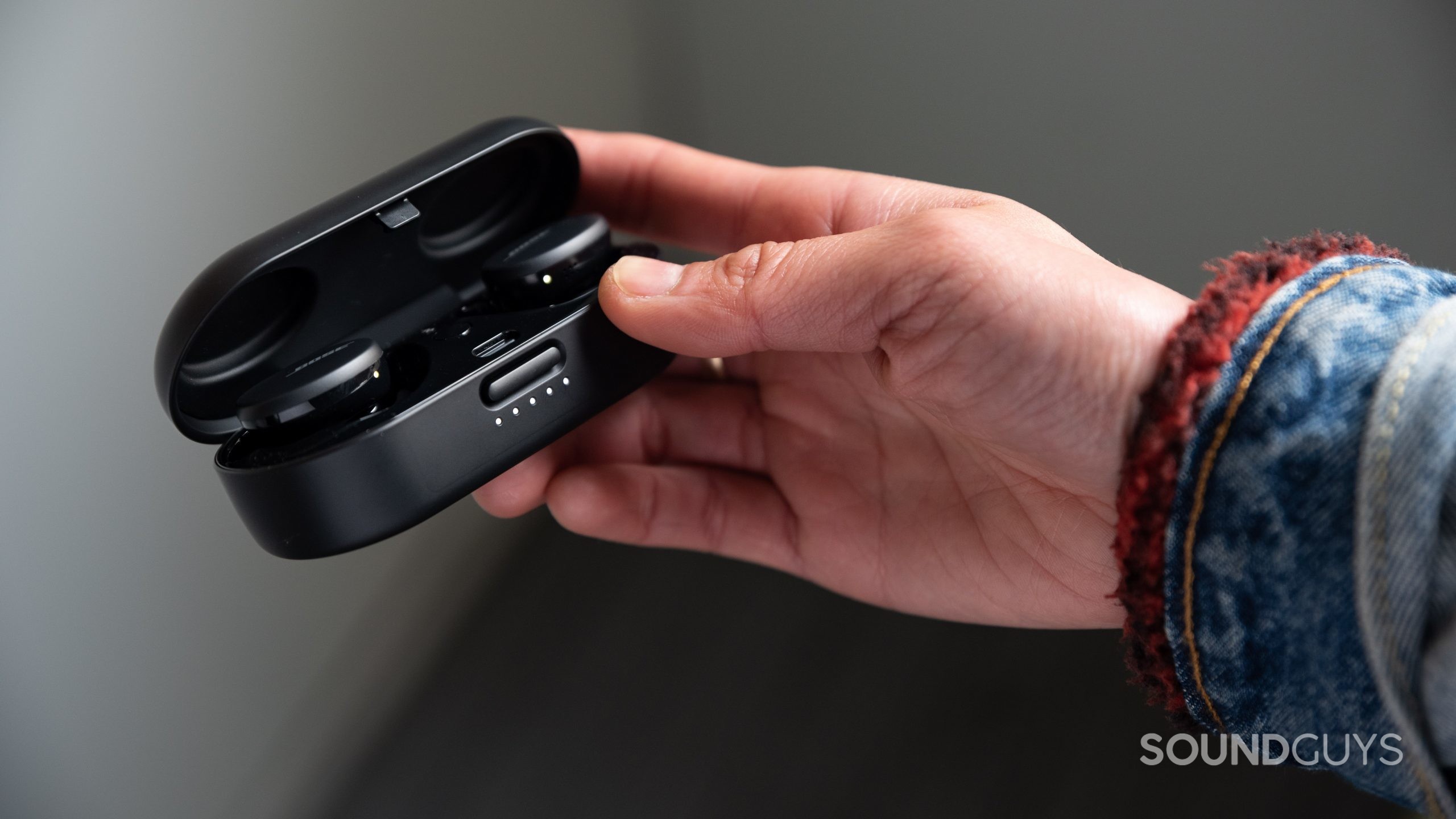
Upon subjecting the Bose Sport Earbuds to a constant 75dB(SPL) output, the earbuds last 5 hours, 17 minutes before the batteries deplete. This is above average for true wireless earbuds, and you can always fast charge the earbuds when in a bind: 15 minutes in the case provides two hours of playback. It takes two hours to charge the earbuds fully and three hours for the case. The Bose Sport Earbuds case doesn’t support wireless charging, so you can keep that Qi charging mat tucked away.
Unfortunately, true wireless earbuds are subject to physical limitations which directly affect battery life and product longevity. See, your earbuds house tiny lithium-ion battery cells like your smartphone, and these degrade over time. More often than not, you use earbuds for one hour, maybe two, at a time before you place them in the case to be topped up completely. This constant partial-depletion, full-charge cycle hastens battery degradation and results in earbuds that may be unable to hold a significant charge past the two-year mark.
How well does the Bose Sport Earbuds block out noise?
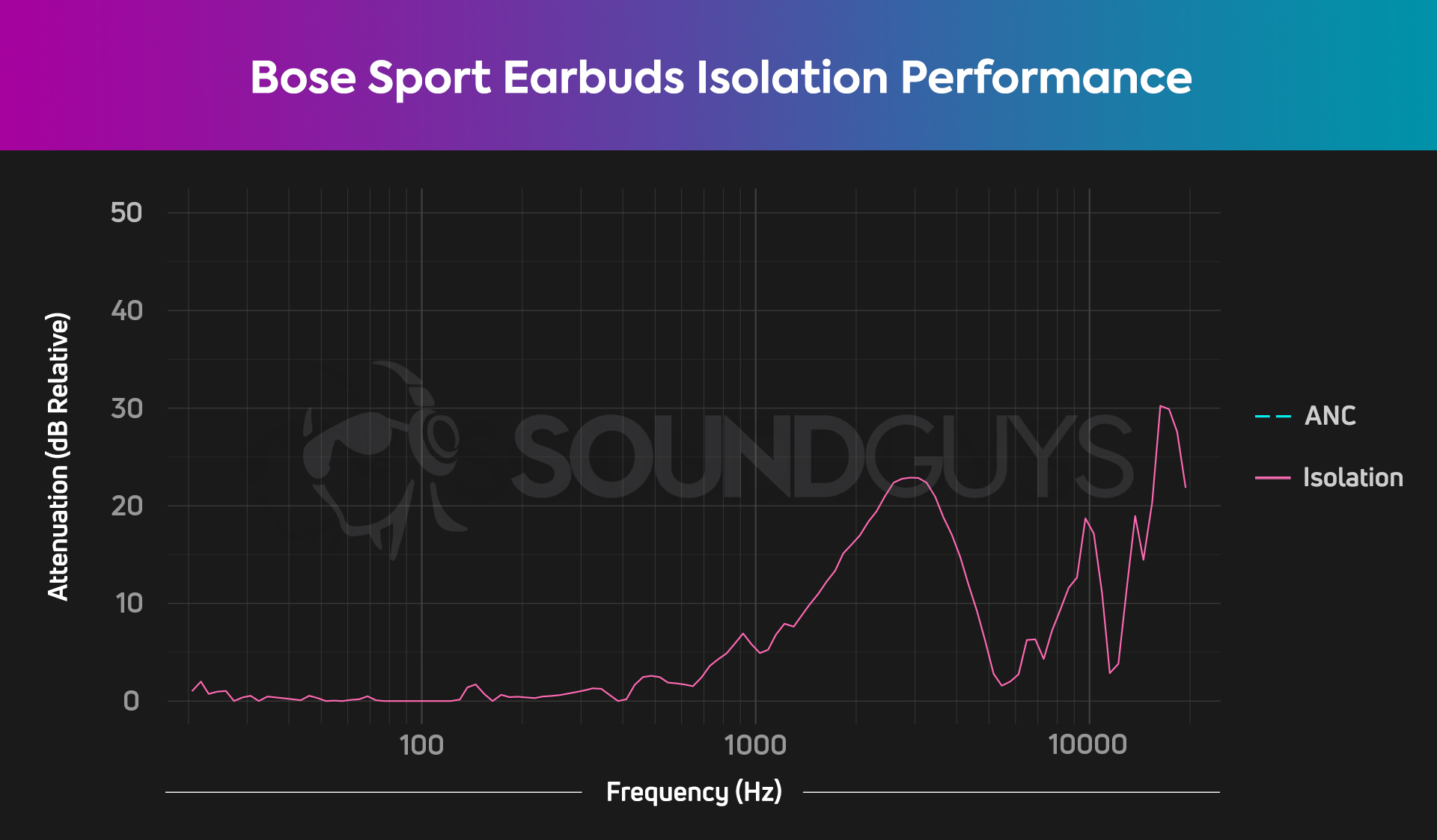
Isolation performance isn’t excellent, or even good, really. Bose prioritizes comfort and stability with its ear tips over blocking out as much external noise as possible. This is a good thing in the context of workout earbuds because they allow you to remain aware of your surroundings. Even if you exercise at the gym instead of outdoors, it’s essential to be aware of what your fellow gym mates are doing, as it could save you from injury. As the chart shows, this is not the pair of earbuds for blocking out low-frequency sounds like a loud A/C unit at your office.
How does the Bose Sport Earbuds sound?
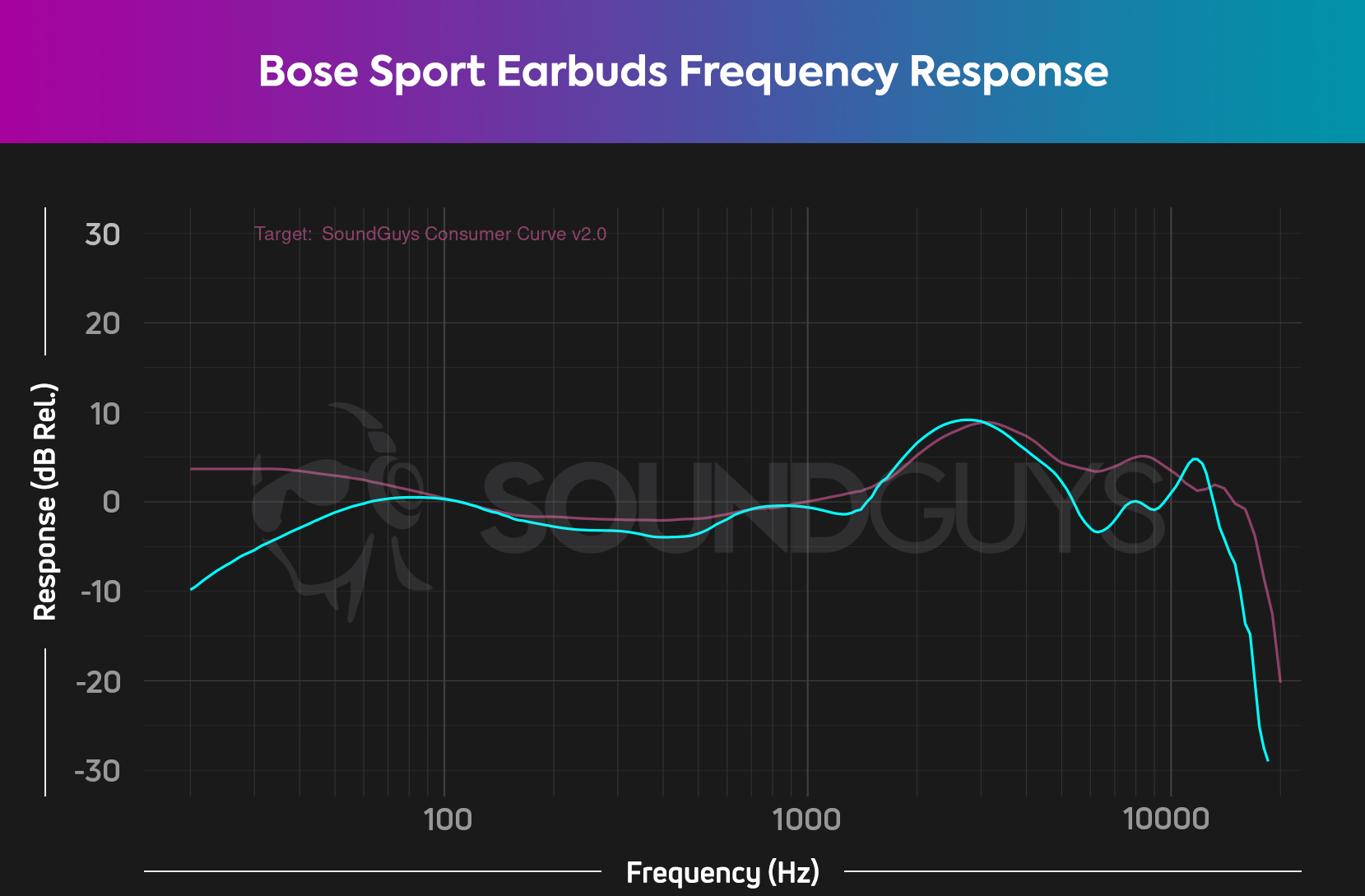
The Bose Sport Earbuds feature a tame frequency response for workout earbuds, reproducing vocals and string instruments well. Typically, anything billed as a workout headset receives a hefty dose of bass emphasis, but here, bass notes sound reasonable. This makes it easier to hear low-end sounds like a kick drum without much auditory masking. Bose under-emphasizes treble frequencies between 5-9kHz, but it’s otherwise not far off the mark of our ideal.
Lows, mids, and highs
Devon Cole’s song July For the Whole Year opens with a C-E-Am-F chord progression, which is produced to sound quiet and distorted. While these chords are strummed, finger snaps ring through clearly, thanks to the exaggerated upper-midrange response. Cole begins the chorus at 0:42, which happens to be when the initial bass drops. Despite Cole’s high vocal range, her voice remains audible on the downbeat. A great example of this is when she sings the phrase, “and the days got colder,” at 2:35.
The earbuds don't block out much outside noise, but this is more of a feature than a drawback.
During the final chorus, Cole harmonizes with herself while singing the lyrics, “July for the whole year.” Her background vocals are easy to hear, even amid the din of the song’s outro, which is an impressive feat for workout earbuds. Again, the bass notes may feel a bit underwhelming for your taste, but to get the best bass response, all you have to do is find the best-fitting ear tips.
Can you use the Bose Sport Earbuds for phone calls?
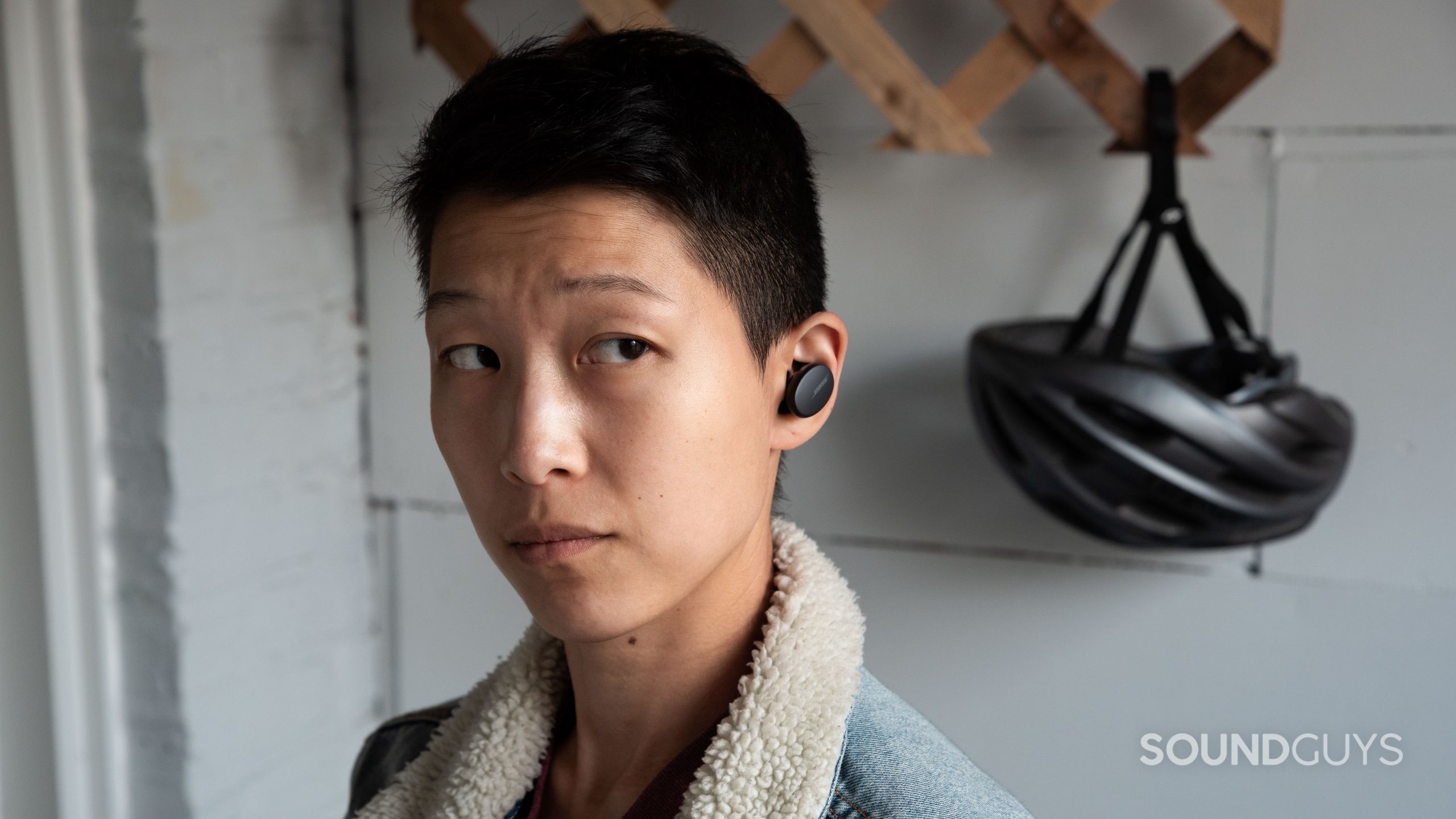
The Bose Sport Earbuds have a four-microphone array, which is impressive, but it’s still an embedded microphone system. Low-frequency sounds are heavily attenuated to reduce the proximity effect, but it’s taken to an extreme and can make those with moderately and extremely low voices sound “off.” Bose deserves credit where credit is due, though: the mics do a great job at reducing predictable, low-frequency background noise like the hum of a microwave.
The Sport Earbuds does an excellent job of prioritizing your voice in windy conditions, though it still picks up the noise. It also tends to sometimes catch some sibilant sounds (those s and sh sounds), although it isn’t distracting.
Bose Sport Earbuds microphone demo (Ideal conditions):
Bose Sport Earbuds microphone demo (Windy conditions):
How does the microphone sound to you?
Should you buy the Bose Sport Earbuds?
The Bose Sport Earbuds are unchallenged as the most comfortable workout earbuds you can buy. Bose’s proprietary StayHear Max ear tips create a secure fit without causing discomfort from a strong suction-like sensation.
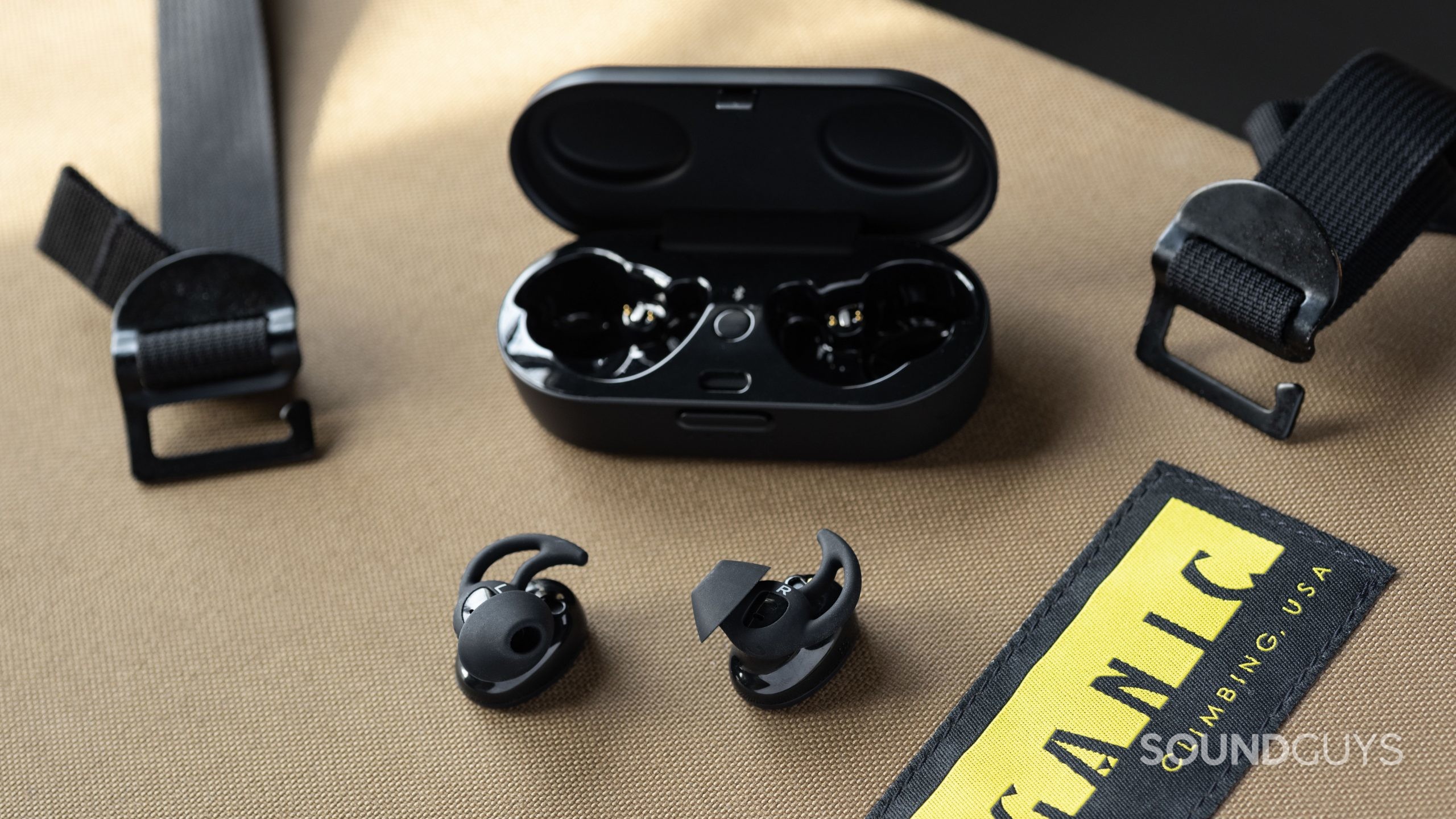
Even though Bose’s earbuds are very good, the company shouldn’t grow complacent: there are plenty of improvements it can make to its earphones via firmware updates. We’ve seen other companies release big feature drops after the initial release of a product, and Bose has already added features and improved connection stability, which is a good sign. Bose soon added a custom EQ module to the Bose Music app, a trend for the company as it did the same for the Bose Noise Canceling Headphones 700 at the behest of its users.
Though there’s plenty of room for improvement, there’s a lot to love about Bose’s second-generation wireless workout earphones. If you want a versatile pair of earbuds that sound very good, you might want to snag this on promotion. Anyone interested in the Bose Sport Earbuds but wants something bone conduction-esque should consider the Bose Sport Open Earbuds.

Suppose you want a similarly durable set of Bose earbuds with some of the best noise canceling around. In that case, we recommend the Bose QuietComfort Earbuds (yes, over the Bose QuietComfort Earbuds II). The Bose QC Earbuds are a great deal now that the QC Earbuds II is out. The active noise canceling is very good, and the default sound profile is significantly better than that of the QC Earbuds II. You even get wireless charging with the first-gen QC Earbuds, which is missing from the Sport Earbuds and QC Earbuds II. The original QuietComfort Earbuds costs $154.96 at Amazon and the QuietComfort Earbuds II costs $249 at Amazon.
What should you get instead of the Bose Sport Earbuds?
The competition is stiff these days in the workout-friendly true wireless earbuds market. Newer models appear to directly challenge the Bose Sport Earbuds, but the Sport Earbuds still make our list of best wireless workout options. What else is out there, you say?
If you have an iPhone, consider the Apple AirPods Pro
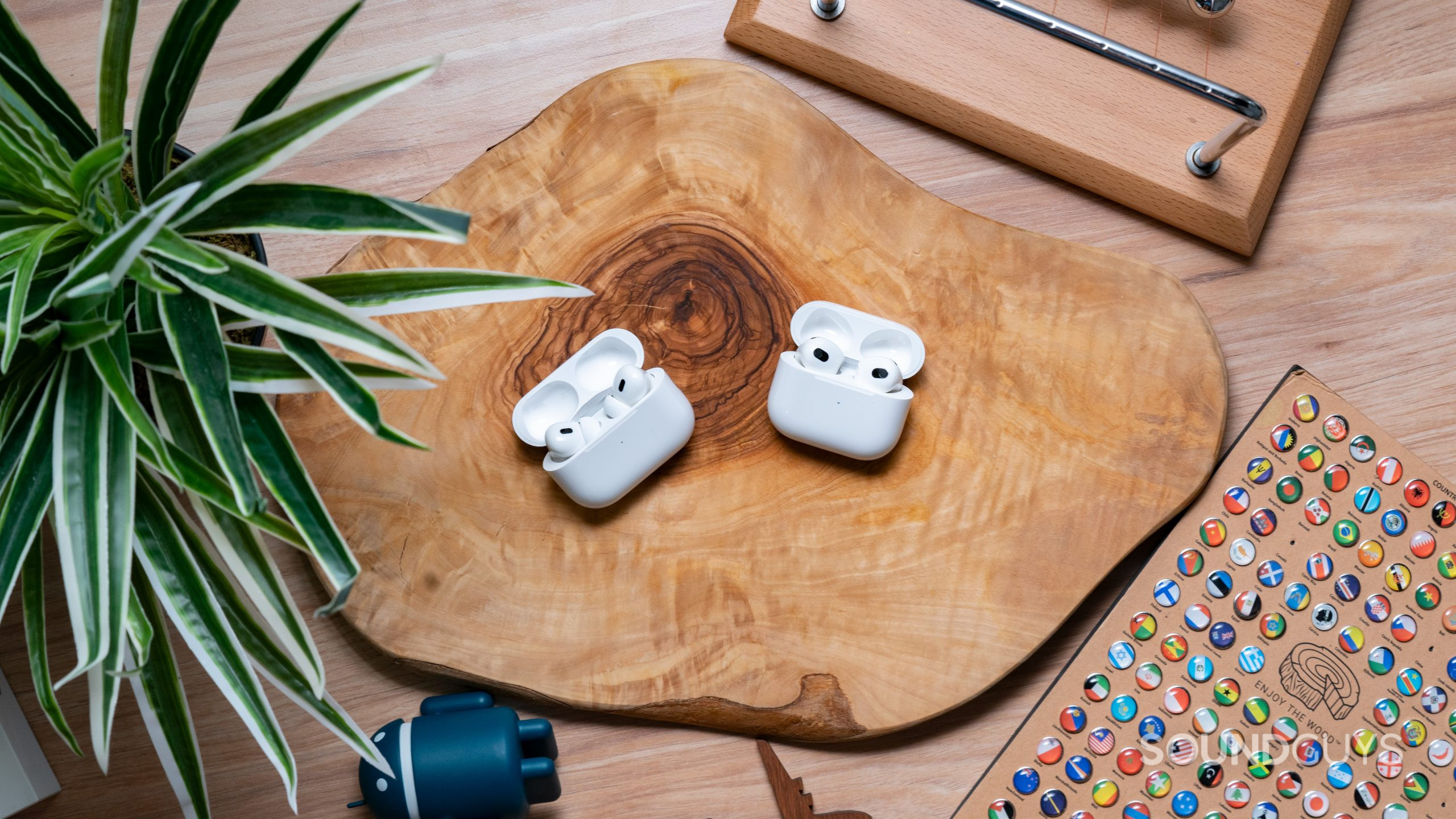
The AirPods Pro (1st generation) compares favorably against the AirPods Pro (2nd generation), with a similar feature set and ANC performance. You get automatic device switching across deviced synched up to the same iCloud account and features like personlized Spatial Audio. While the Apple AirPods Pro (2nd generation) is more future-proof with its H2 and U1 chips, the AirPods Pro (1st generation) is a great deal and costs on the product’s website. You’ll pay a higher price tag for the AirPods Pro (2nd gen) ($199.99 at Amazon).
What makes the Beats Fit Pro a great alternative to the Bose Sport Earbuds?
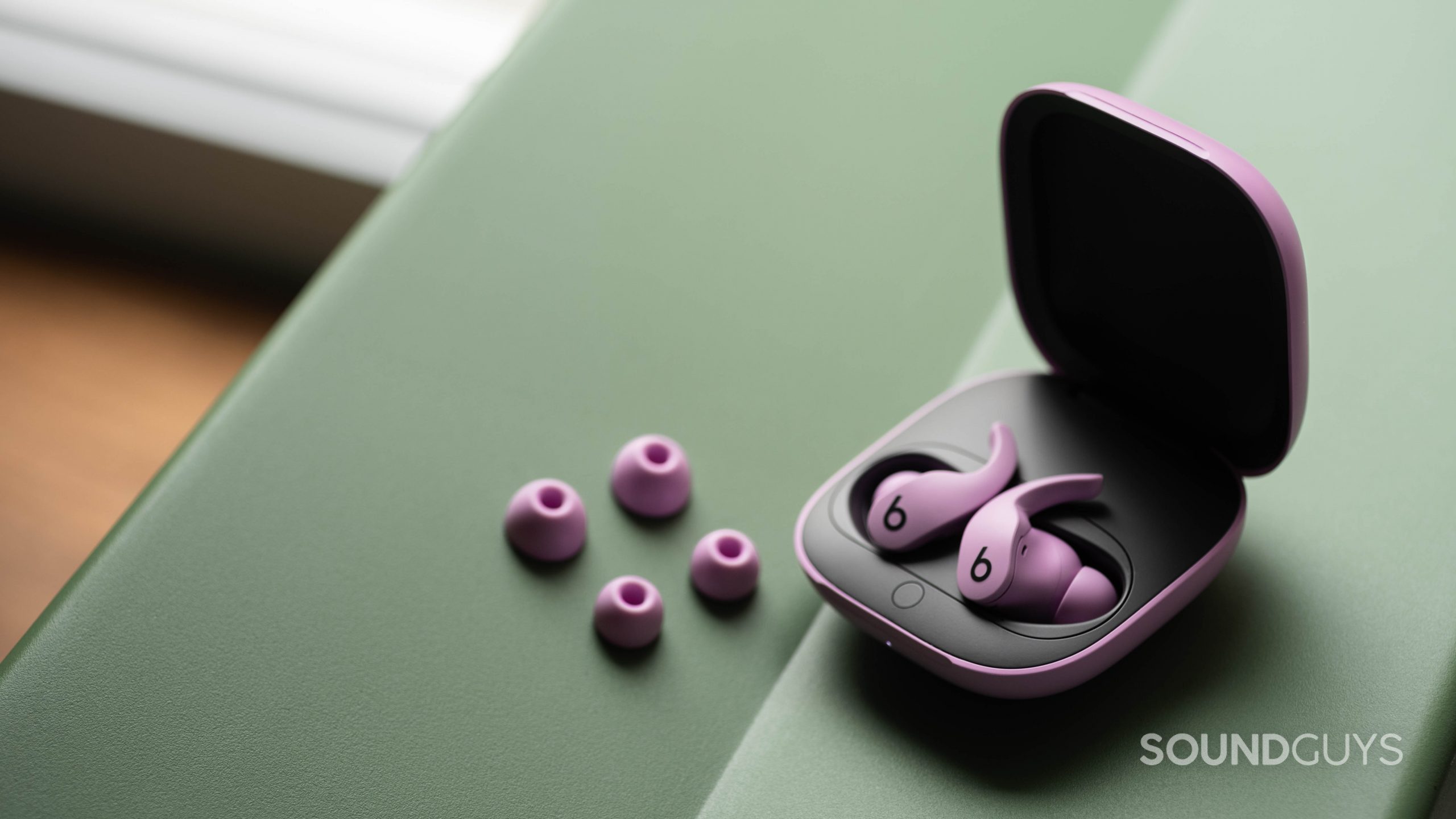
Like Bose’s workout earbuds, the Fit Pro from Beats features a stable fit for athletes. The Fit Pro earbuds have built-in ear wings that secure the buds to your ears no matter how hard you shake your head. Some may prefer the more malleable material of the Bose Sport Earbuds’ ear tips, but that boils down to personal preference. Similar to the Beats Studio Buds, the Fit Pro works nearly as well on Android as it does on iOS because Android phone owners can download the Beats app to customize their experience. When paired with an iPhone, you get all the premium comforts like personalized Spatial Audio, Apple Find My support, automatic device switching, and more.
What makes the Beats Fit Pro stand out from the Sport Earbuds is Beats’ noise canceling technology. This is quite good and rivals the AirPods Pro (2nd generation), though the AirPods has better ANC. You also get automatic ear detection on the Fit Pro, which Bose’s earbuds lack. The Beats Fit Pro comes in a few colors (Beats Black, Beats White, Sage Gray, Stone Purple; and Kim K Special Editions Earth, Dune, and Moon) and costs $159 at Amazon.
The Jaybird Vista 2 brings solid noise cancelation and durable construction.
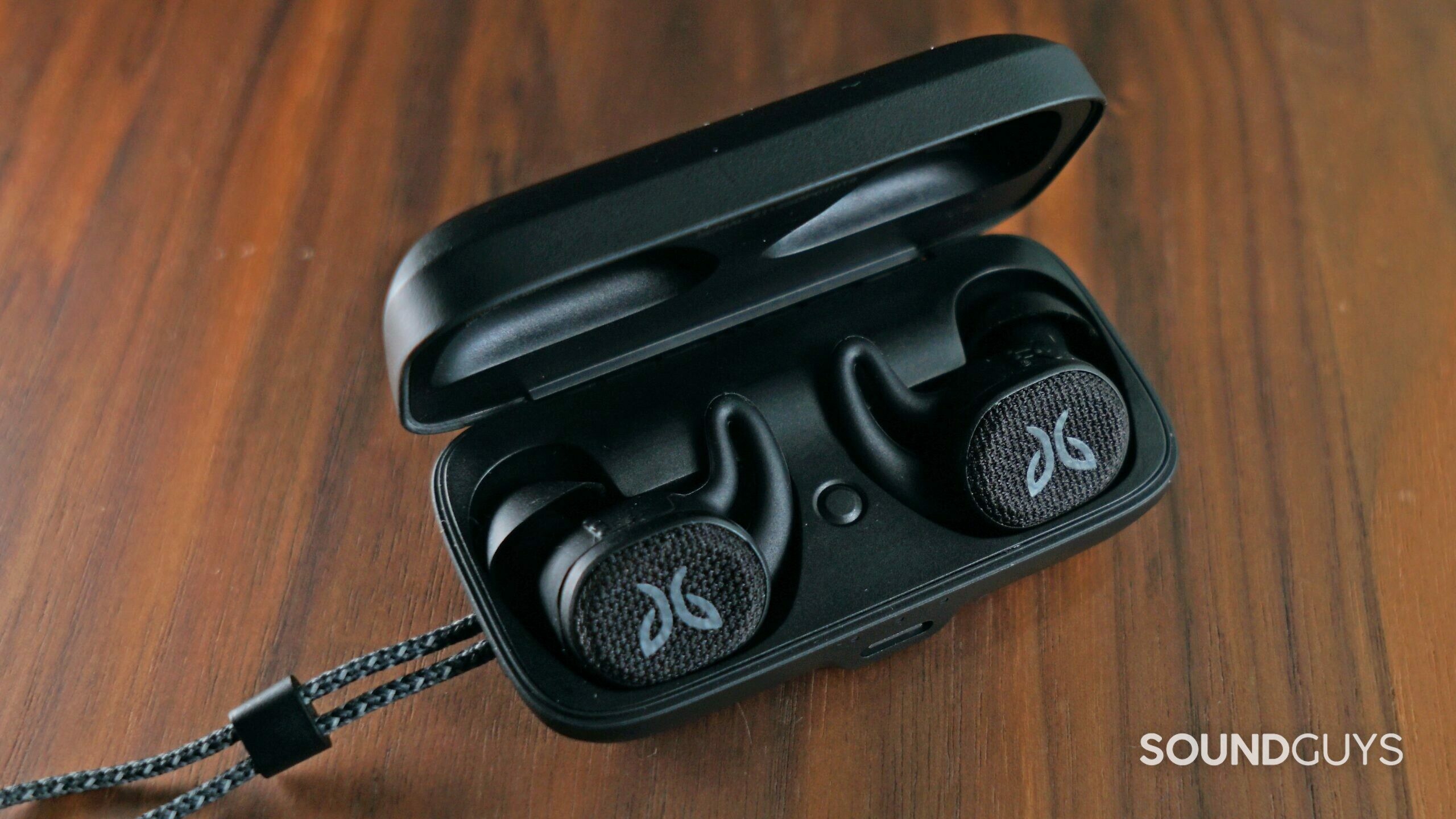
The Vista 2 builds upon the success of the first-gen Vista earphones, and this time around, Jaybird includes active noise canceling. While the Vista 2 can’t compete with the Sony WF-1000XM4 or even the Sennheiser CX Plus True Wireless, the passive isolation does most of the heavy lifting to keep background noise out.
The earbuds feature an IP68 rating, while the case merits MIL-STD-810G certifications. This headset is pretty pricy, but for the right buyer, it’s worth it ($117 at Amazon).
Try the Jabra Elite Active 75t instead
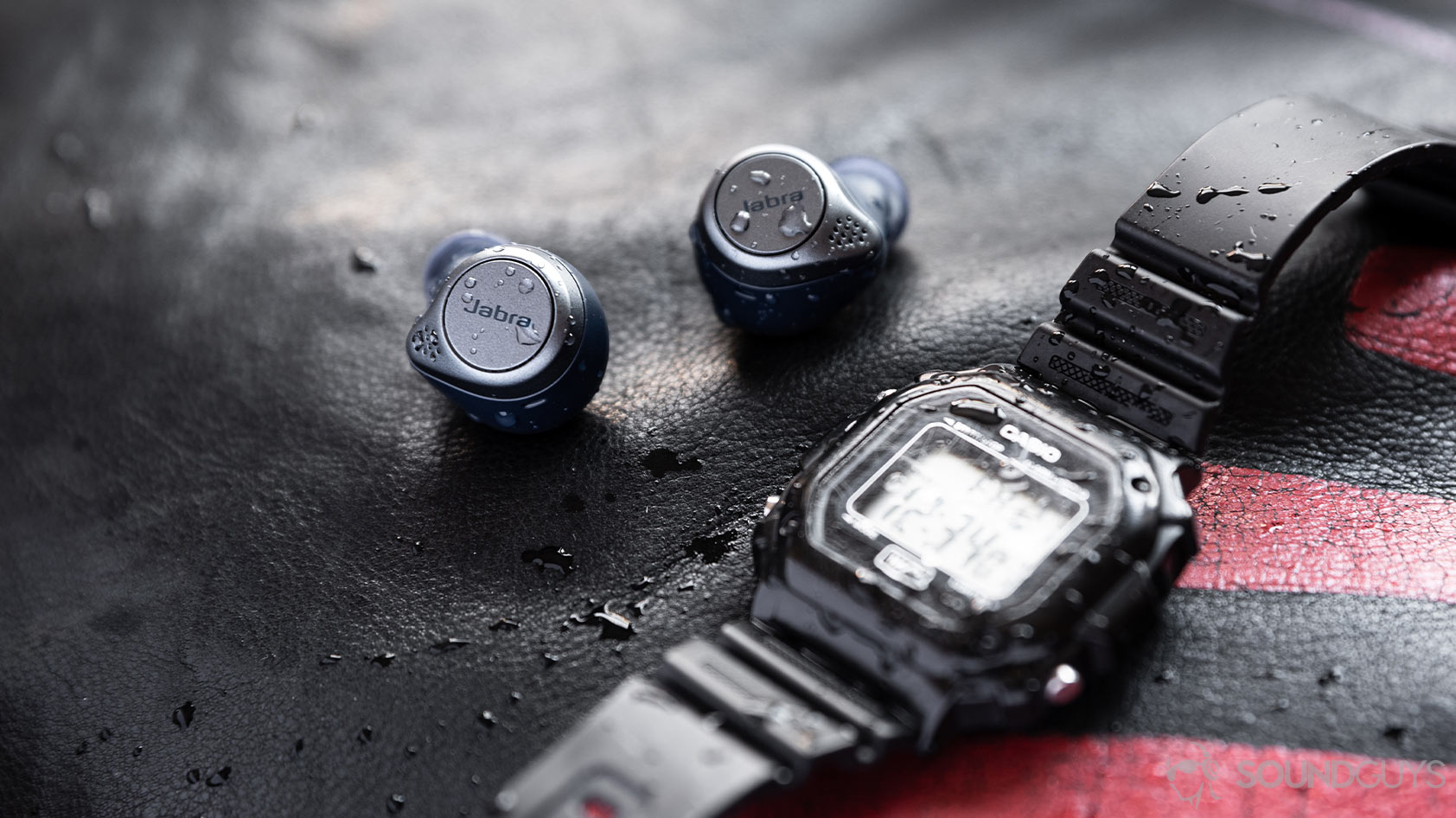
Don’t forget that there are plenty of attractive alternatives like the Jabra Elite Active 75t. With an IP57 rating, you can feel safe that it’ll survive whatever workout you throw at it. Audio tinkerers will appreciate Jabra’s custom EQ settings, which can tone down the emphatic bass response.
You can even hold meetings while running because the microphone is quite good. The onboard ANC leaves something to be desired, but if that’s not a deal breaker, the Elite Active 75t may make you reconsider if you want Bose. With newer Jabra earphones on the market, you can get the Elite Active 75t for a pretty good deal. Currently, the Elite Active 75t costs $149.99 at Verizon.
If you want a more premium workout experience, check out the Jabra Elite 4 Active and Jabra Elite 7 Active.
Frequently asked questions about the Bose Sport Earbuds
No, the Bose Sport Earbuds do not have internal storage.
Yes, the Sport Earbuds will work with Bose SimpleSync. If you have something like the Bose Smart Soundbar 600, you can synchronize audio output with the Sport Earbuds and even non-Bose earbuds and headphones.
Yes, the Sport Earbuds case charges via USB-C cable, which Bose provides.
The Bose Sport Earbuds make huge improvements over the Bose SoundSport Free, but it’s far from perfect.
While some may prefer the more futuristic touch controls on the Sport Earbuds, it’s more limited than the SoundSport Free buttons. The company’s debut true wireless earbuds let you control playback, access your smart assistant, and control the volume. The Sport Earbuds have automatic ear detection in the right bud, but I prefer more comprehensive controls at the expense of newer, less functional tech.
Neither headset’s app supports any kind of EQ, so the sound profile Bose provides is all that you get. The earphones have similar frequency responses. If you like how the older model reproduces your favorite songs, you’ll be pleased with the Sport Earbuds. Despite the few onboard controls, Bose’s Sport Earbuds are the better overall headset. The SoundSport Free costs $383 at Amazon and is hard to find.
The Bose Sport Earbuds and the Sony WF-SP800N offer very similar experiences, but there are some meaningful differences. The Sony earbuds are more expensive but feature a superior IP55 rating, which will be vital if you need something more rugged. If you exercise outside rather than at the gym, you may want them instead of the Bose earbuds.

Thank you for being part of our community. Read our Comment Policy before posting.